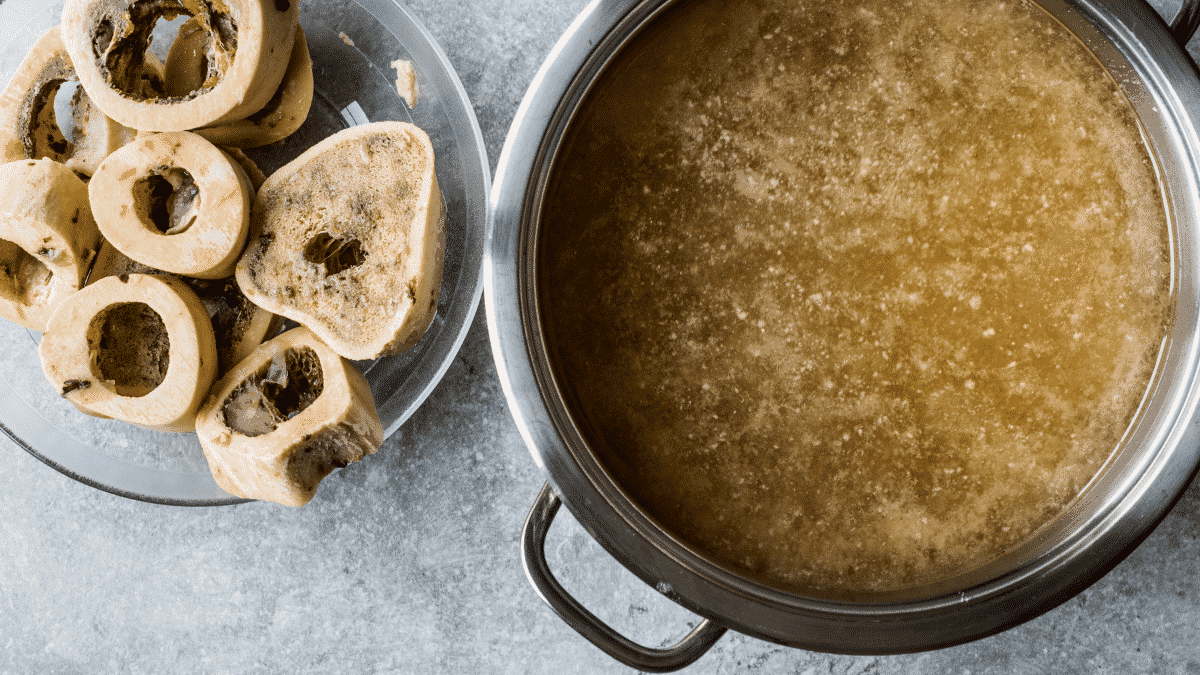Answer: No. Vegans should not eat bone broth.

Can Vegans Eat Bone Broth?
Bone broth comes as a cooking liquid that people use for a variety of dishes and recipes. People also call it stock (beef stock, chicken stock, etc.). It forms when you cook/simmer the meat or bones of animals for an extended duration. The primary flavor comes from the cartilage, bone marrow, or other attached tissue. So, it’s about as far away as you can go from a vegan diet.
Traditional views point to the fact that bone broth is supposed to be healthier than other food items. That explains why so many people like the taste but believe in the superiority of nutrition. But this, of course, is not entirely true. Like most other animal-based food, there are equally nutritious and more ethical food items available. But before we look into the better alternatives, let’s learn about what makes people think bone broth is better.
Supposed Nutrition
The most common health claim you’ll hear about bone broth is the collagen aspect. Collagen is one of the main/primary proteins that our bodies use. It accounts for about 30% of the total protein in the average human body. People may claim that bone broth allows more intake of collagen or helps you increase your levels. You may also hear about gelatin, which is a derivative of collagen.
The important thing to note about collagen is that it does not come from food directly. So, whether you’re a vegan or a meat eater, you’re not eating your collagen in any way. The body generates collagen from the nutrition it gets from food. So, that should clear up any doubts about whether consuming bone broth directly increases your collagen. There are now studies that reveal how bone broth may not even be as nutritious as people claim.
The key takeaway here is that bone broth isn’t the only source of proteins. In fact, it’s not even the most efficient way of getting your nutrition. It involves a lot of preparation even before you can eat or use it in a dish. As vegans, it’s an easy ‘No’ for any of these food products that involve breeding animals for slaughter and commercial consumption.
What Are the Alternatives?
When it comes to boosting collagen levels, there are simpler and more ethical options than traditional sources like bone broth—which is not considered vegetarian. In 2025, science has advanced to enhance microorganisms that naturally stimulate collagen production in the body without relying on animal products or livestock. Many vegetarian supplements now offer a balanced approach to collagen support, making them safer, more affordable, and easier to incorporate into your diet. These innovative alternatives not only reduce allergy risks but can also improve your skin’s health and complexion—providing a plant-friendly pathway to glowing skin without compromising your dietary choices.
If you add some nuts and seeds to your existing diet, you’ll get the extra mineral nutrients that your body needs to run at an optimum balance. Normal vegan diets already have green veggies and fruits, so we won’t add anything to that. Add some beans, rice, and potatoes, and you’re all set!
Your Very Own Vegan Broth
You already have the nutrition you need with a rich vegan diet. But if you want the taste and feel of a broth, you can always make your own. Here’s a quick recipe.
· Shitake Mushrooms
They’re rich in vitamins, minerals, and essential amino acids. Try to get sun-dried mushrooms for an added dose of Vitamin D. Shitakes bring great flavor to the stock, so you don’t have to worry about taste.
· Turmeric
It helps digestion, and it’s a natural anti-inflammatory ingredient. Indian recipes usually use it both for color and flavor.
· Kale or spinach
Get your stock filled with minerals and vitamins with these greens.
· Coconut Aminos
It gives great flavor to the entire mixture. However, some people also consider it as sugar, so you can leave out this bit if you want. Instead, add seaweed or coconut oil for healthy fats.
Simmer the ingredients in the desired amount of water for some time. Wait till the essence of the veggies and spices disseminate into the dish. Once done, you can store it in your fridge. You can enjoy it directly like a stew or use it as a base for other dishes too.




